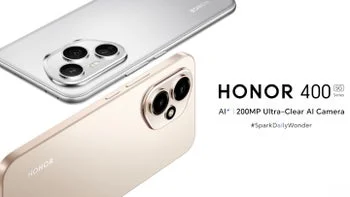
Honor Partners with Google to Launch AI Image-to-Video on New Phones: A Glimpse into the Future of Content Creation
Honor is shaking up the smartphone market by integrating Google's cutting-edge AI image-to-video technology directly into its new Honor 400 series. This collaboration, launching ahead of wider availability for Gemini users, promises to transform static images into engaging short videos, marking a significant leap in mobile content creation.
The Honor 400 and 400 Pro, set to launch on May 22nd, will be the first devices to feature this innovative tool. Powered by Google's Veo 2 model, the AI generates five-second videos from images, offering both portrait and landscape formats. While the process takes only a minute or two, the tool prioritizes simplicity, foregoing text prompts in favor of direct image analysis.

Early tests reveal the AI's varying degrees of success. While it excels with straightforward subjects like portraits of people or pets, producing realistic movement, it sometimes struggles with more complex scenes. One tester recounts hilarious mishaps involving vintage cars rotating impossibly, ghostly hands caressing tomatoes, and a chaotic women’s soccer game with an absurd number of players. Perhaps the most memorable result was a pigeon inexplicably flying out of Vincent van Gogh's eye in a self-portrait.

Honor's UK marketing director Chris Langley indicated that the image-to-video feature will be initially free for Honor 400 owners, limited to ten video generations per day for the first two months. Eventually, a Google subscription will be required. This mirrors Google's existing Veo 2 integration within Gemini Advanced, which currently focuses on text-to-video generation. Within Google Cloud, image-to-video generation using Veo 2 costs 50 cents per second for approved users.
Beyond image-to-video, Honor is also introducing AI Outpainting and AI Eraser features, enhancing creative options for users. AI Outpainting expands images while maintaining consistency, and AI Eraser adeptly handles scenes with multiple subjects. Users won't need an Honor account to access these features initially, but some advanced functions may require it in the future.
Eric Fang, Senior Director of Product Planning at Honor, emphasized the potential for AI to revolutionize content creation, particularly for marketers and content creators seeking engaging videos for social media and advertising. He also assured that user privacy remains a top priority, with data not used for training the AI.
The integration of Google's AI image-to-video technology into the Honor 400 series raises intriguing questions about the future of mobile content creation. Will consumers embrace these new AI-powered features, and how will they impact the creation and consumption of digital content? Share your thoughts and predictions in the comments below!